
BioMed Central
Page 1 of 7
(page number not for citation purposes)
Implementation Science
Open Access
Meeting report
Riding the knowledge translation roundabout: lessons learned from
the Canadian Institutes of Health Research Summer Institute in
knowledge translation
Michelle E Kho*1, Elizabeth A Estey2,3, Ryan T DeForge4, Leanne Mak5 and
Brandi L Bell6
Address: 1Department of Clinical Epidemiology and Biostatistics, McMaster University, Hamilton, ON, Canada, 2Centre for Aboriginal Health
Research, University of Victoria, Victoria, BC, Canada, 3Li Ka Shing Knowledge Institute, St. Michael's Hospital, Toronto, ON, Canada,
4Department of Health and Rehabilitation Sciences, The University of Western Ontario, London, ON, Canada, 5Department of Psychology,
University of Manitoba, Winnipeg, MB, Canada and 6Comprehensive School of Health Research, University of Prince Edward Island,
Charlottetown, PEI, Canada
Email: Michelle E Kho* - khome@mcmaster.ca; Elizabeth A Estey - elizabeth.estey@gmail.com; Ryan T DeForge - rdeforge@uwo.ca;
Leanne Mak - ummakl@cc.umanitoba.ca; Brandi L Bell - brbell@upei.ca
* Corresponding author
Abstract
Background: Funding the education and training of the next generation of health researchers is a
key mandate of the Canadian Institutes of Health Research (CIHR) knowledge translation (KT)
portfolio. The field of KT is growing daily; thus, the training and development of a new generation
of KT researchers is essential.
Methods: Using curriculum documents, participant evaluations, and self-reflection, this paper
describes a unique Summer Institute hosted by the CIHR in Cornwall, Ontario, Canada. We outline
the key aspects of a successful training initiative that could inform organizations and agencies
worldwide with an interest in or who have a mandate for KT.
Results: This work provides potential funders, faculty, and students with an inside look into the
purpose, process, and outcomes of such training initiatives.
Conclusion: National and international KT organizations, research institutions, and funding
agencies are encouraged to consider replicating the training model employed here, as investment
into KT personnel will foster the advancement of the field within and beyond local borders.
'To the individual who devotes his/her life to science, nothing can give more happiness than when
the results immediately find practical application. There are not two sciences. There is science and
the application of science, and these two are linked as the fruit is to the tree.' – Louis Pasteur, 1871
(from presentation by Ian Graham, 2008 CIHR Knowledge Translation Summer Institute)
Introduction
Knowledge translation (KT) is a young field that is grap-
pling with its definition, terminology, and methodologies
[1,2]. At the most basic level, however, KT is about putting
knowledge into action. In this paper, we use the Canadian
Institutes of Health Research (CIHR) definition of KT: 'a
Published: 12 June 2009
Implementation Science 2009, 4:33 doi:10.1186/1748-5908-4-33
Received: 31 December 2008
Accepted: 12 June 2009
This article is available from: http://www.implementationscience.com/content/4/1/33
© 2009 Kho et al; licensee BioMed Central Ltd.
This is an Open Access article distributed under the terms of the Creative Commons Attribution License (http://creativecommons.org/licenses/by/2.0),
which permits unrestricted use, distribution, and reproduction in any medium, provided the original work is properly cited.

Implementation Science 2009, 4:33 http://www.implementationscience.com/content/4/1/33
Page 2 of 7
(page number not for citation purposes)
dynamic and iterative process that includes synthesis, dis-
semination, exchange, and ethically sound application of
knowledge to improve the health of Canadians, provide
more effective health services and products, and
strengthen the healthcare system' [3]. With a legal man-
date for KT, the CIHR has made significant contributions
that are recognized both nationally and internationally
[4]. Funding education and training of the next generation
of Canadian health researchers in KT is an important part
of the CIHR's KT portfolio; formal opportunities to
develop and train new KT researchers and experts are
needed by healthcare systems to ensure that a mandate for
KT is sustained within the research and decision-making
communities [3].
One example of a training initiative is the CIHR's Innova-
tion in Knowledge Translation Research and Knowledge
Translation Summer Institute (KTSI), which occurred
from 22 to 25 June 2008 in Cornwall, Ontario, Canada.
This intensive, four-day strategic capacity-building insti-
tute was funded by the CIHR's Institutes of Health Serv-
ices and Policy Research (IHSPR), Population and Public
Health (IPPH), and the Knowledge Synthesis and
Exchange Branch. Dr. Jeremy Grimshaw of the CIHR
funded KT-ICEBERG (Improving Clinical Effectiveness
through Behavioural Research Group) [5], and the Clini-
cal Epidemiology Program of the Ottawa Hospital
Research Institute (OHRI) was the host. Through faculty
engagement and a variety of different teaching methods,
30 Canadian trainees actively learned about the science of
KT.
The KTSI had four specific aims, focusing on health serv-
ices and policy or population and public health areas:
explore the challenges of planning and carrying out KT
research and KT involving and/or engaging different
stakeholder groups; increase the understanding of con-
cepts, methods, and theories relevant to KT research,
including learning about the concepts that underlie the
evidentiary base for effective KT targeting different deci-
sion-making groups, and investigating the contribution of
different disciplinary and methodological approaches.
Explore ethical issues associated with KT research and KT
In contrast to a meeting report written by course tutors, we
are five of the meeting participants (brought together
through small group work during the KTSI) and present
an end-user perspective of this training initiative. Using
curriculum documents, participant evaluations, and self-
reflection, we use this paper to share the teaching model
of the KTSI curriculum, document our experiences, and
present some of the key lessons learned. We believe that
the KTSI model is a helpful starting point to inform other
funding agencies or research groups who wish to develop
new researchers and experts in the KT field.
The KTSI structure and curriculum
The application process
Over 150 trainees applied to fill the 30 spots available for
the KTSI through a competitive process. The CIHR encour-
aged applications from different disciplines; however,
applicants must have had research interests in KT research
or in integrating KT into their research. The selection com-
mittee assessed each application based on the candidate's
academic status (five points, preference to PhD students
or postdoctoral fellows), research awards held (five
points, preference to those holding research awards) and
written responses to three essay questions (40 points;
Appendix 1 outlines the KTSI questions applicants com-
pleted). Two independent reviewers assessed each appli-
cation using a block design so that each reviewer was also
paired with every other reviewer for at least five applica-
tions. The a priori cutoff score for inclusion was 80% (40
of 50 points).
Almost all successful applicants (97%) were enrolled in
doctoral studies or held postdoctoral fellowships focused
on KT, and 80% held CIHR awards. Participants repre-
sented 16 different Canadian institutions, and a variety of
faculties and departments, including communications,
engineering, health promotion, and political science.
Additional file 1 outlines the research projects and inter-
ests of the authors (responses to Appendix 1, question
one).
Curriculum
Twelve faculty with KT expertise representing Canada, the
United States, and the United Kingdom, shared their
knowledge and experience with trainees. Faculty purpose-
fully designed the curriculum to expose participants to
basic research methodology in KT, varied areas of KT
research and applications of KT targeted towards different
stakeholder groups (e.g. public, clinicians, and policy
makers), international perspectives of KT, and ethics of KT
research. The KTSI included plenary presentations, con-
current sessions aimed at skill building in methods and/
or research techniques and interactive case studies. A
small group activity focused on developing, implement-
ing, and evaluating a KT strategy encouraged students to
collaborate together to prepare a presentation on the final
day of the institute. Faculty mentors acted as guides and
facilitated the small group meetings to ensure that the stu-
dents understood the task requirements. (Table 1 outlines
the KTSI faculty, Table 2 summarizes the daily program
and curriculum[6], and Appendix 2 outlines the small
group project. Additional file 2 provides detailed informa-
tion about the daily program and curriculum).
Among trainees, there was a sense that the mix of different
learning forums informed by educational theories about
adult learning factored greatly into the success of the KTSI.

Implementation Science 2009, 4:33 http://www.implementationscience.com/content/4/1/33
Page 3 of 7
(page number not for citation purposes)
For example, didactic lectures from faculty, one-on-one
meetings between trainees and faculty, and active learning
sessions where we worked through a 'real' KT problem in
small groups enabled an effective learning environment.
From our perspective, the small group work provided the
most useful opportunity to apply our new and existing
knowledge of KT because it gave us time and space to
interact with our peers and to learn by doing. Thus, we
had the freedom to learn as we worked, the chance to turn
to faculty mentors when we needed them, and the oppor-
tunity to see first-hand the complexity, confusion, and
multiple stages required in developing a KT strategy.
In our small group task, we developed a KT strategy to
reduce inappropriate antibiotic use in primary care
(Appendix 2, task 5; Additional file 3). As a diverse multi-
disciplinary group, we struggled with our different (and
sometimes conflicting) perspectives, which varied from
perceptions of healthcare terminology (e.g. definition of
primary care) to different conceptual approaches to prob-
lem solving (e.g. use of logic models). Our facilitators
helped us constructively negotiate our differences by ena-
bling group synergy, reinforcing trust and respect among
team members, and creating a safe space for diverse
voices. We found that working through the task was an
Table 1: Faculty members at the 2008 Canadian Institutes of Health Research Summer Institute
Name Title(s) Affiliation(s)
Laurie M. Anderson, PhD Health Scientist US Centres for Disease Control and Prevention
Richard Baker, MD Professor of Quality Health Care
Head, Department of Health Sciences
University of Leicester, United Kingdom
Melissa C. Brouwers, PhD Associate Professor
Provincial Director, Program in Evidence-based
Care
Project Lead, Capacity Enhancement Project
Department of Clinical Epidemiology and Biostatistics,
McMaster University, Canada
Cancer Care Ontario
Canadian Partnership Against Cancer Corporation
Donna Ciliska, RN, PhD Professor, School of Nursing
Scientific Director
McMaster University, Canada
National Collaborating Centre for Methods and Tools
Jill J. Francis, PhD Health Psychology Lead, Health Services
Research Unit
University of Aberdeen, United Kingdom
Ian D. Graham, PhD Vice-President of Knowledge Translation Canadian Institutes of Health Research
Jeremy M. Grimshaw, MD, PhD Director, Clinical Epidemiology Program
Canada Research Chair in Knowledge Transfer
and Uptake
Ottawa Health Research Institute, Canada
University of Ottawa, Canada
John N. Lavis, MD, PhD Director and Investigator
Canada Research Chair in Knowledge Transfer
and Exchange
Program in Policy Decision-Making
McMaster University, Canada
Doug G. Manuel Senior Scientist
Associate Professor
Institute of Clinical Evaluative Sciences, University of
Toronto, Canada
Department of Public Health Sciences, University of
Toronto, Canada
Craig R. Ramsay Programme Director
Senior Statistician
Health Care Assessment Program of the Health Services
Research Unit, Aberdeen, United Kingdom
Jon Salsberg, MA Research Manager Department of Family Medicine
McGill University, Canada
Sharon E. Straus, MD, FRCPC, MSc Associate Professor
Canada Research Chair in Knowledge
Translation
Department of Medicine, University of Calgary, Canada
Department of Medicine, University of Toronto, Canada
Li Ka Shing Knowledge Institute, University of Toronto,
Canada
Charles Weijer, MD, PhD Canada Research Chair in Bioethics University of Western Ontario, Canada

Implementation Science 2009, 4:33 http://www.implementationscience.com/content/4/1/33
Page 4 of 7
(page number not for citation purposes)
important part of experiencing how to carry out KT
research. Thus, our group work informs our lessons pre-
sented herein. Additional file 4 outlines our slide deck
from our final presentation.
Key lessons learned
Because the KTSI provided us with many diverse opportu-
nities to learn and share knowledge, we all continuously
drew our own lessons and ideas. However, there were
some key lessons that resonated within our small group.
We share these lessons here because we think they high-
light the essence of our experience and demonstrate how
education and training can facilitate a deeper understand-
ing and passion for KT. Our discussion will also highlight
the implications of these lessons for future training initia-
tives.
KT is interdisciplinary and collaborative
Because the goal of KT is to use research in healthcare
practice, it inherently involves partnership. Therefore,
researchers from various disciplines (e.g. sociology, med-
icine, psychology, nursing, nutrition, engineering) engage
in KT research, and we need different people to fill many
roles within the context of the research. The CIHR distin-
guishes between end-of-grant KT and integrated KT (IKT)
[3,7]. In the former case, this partnership may extend
beyond the core research team at the end of the project to
include communications experts to help with the dissem-
ination of findings. In the latter, partners are engaged
throughout the research process, from the development of
the research question to its dissemination. Thus, IKT is
often likened to participatory action research (PAR),
Table 2: Summary of curriculum from the 2008 Canadian Institutes of Health Research Summer Institute
Activity Presenter Topic
Day 1
Welcome Jeremy Grimshaw
Plenary Ian D. Graham Knowledge translation at CIHR
Plenary Laurie M. Anderson Knowledge for knowledge translation
Plenary John N. Lavis Knowledge translation for policy makers
In the spotlight Ian D. Graham Overview of his academic and career path from graduate school to current
professional position.
Day 2
Plenary Jon Salsberg Integrated knowledge translation (IKT)
Introduction to group work Jeremy Grimshaw
Group work
KT in Action Melissa C. Brouwers Advancing the quality of cancer care: An intersection between KT/KTE
research, a Health Service, and a Healthcare System
Plenary Sharon E. Straus Knowledge translation targeting healthcare professionals
Plenary Jill Francis Behavioural approaches to knowledge translation
Group work
Plenary Jill Francis and Jeremy Grimshaw Developing knowledge translation interventions
Discussion/Group task Sharon E. Straus Mentorship[6]
Day 3
Plenary Jeremy Grimshaw Knowledge translation research
Group work
KT in Action Doug Manuel KT in action: Population benefit of Canadian Lipid Guidelines
Plenary Craig Ramsay Evaluating knowledge translation interventions
Group work
Plenary Donna Ciliska Knowledge translation in public health
Plenary Richard Baker United Kingdom perspectives
Faculty and student interaction Trainees had opportunities to book 15-minute one-on-one meetings with
faculty members of their choice to discuss career plans or research.
Day 4
Plenary Charles Weijer Ethics of knowledge translation and knowledge translation research
Group presentations Trainees

Implementation Science 2009, 4:33 http://www.implementationscience.com/content/4/1/33
Page 5 of 7
(page number not for citation purposes)
which includes similar principles of engagement, partner-
ship, and reciprocity in research [8,9].
Negotiation skills are integral
We learned that because KT is interactive and collabora-
tive, good negotiation skills and an effective mediation
strategy are necessary to keep a large-scale research
project, including its multiple researchers, partners, and
support staff, on track. Through our group work, we iden-
tified the importance of negotiation and found that even
in this brief time, creating a safe space to allow team mem-
bers to express ideas, and finding ways to manage our dif-
ferences in opinions and perspectives were keys to our
success. We appreciated our assigned faculty members
who acted as facilitators and content experts.
The KT process is complex, confusing, and multifaceted
The plenary sessions, and particularly our small group
work, taught us that having negotiation strategies and
supports are essential in the 'real world' of KT. While this
means that KT research is often 'messy', it also means that
it is interesting, engaging, and can be an incredible learn-
ing experience for the research team. For example,
although the small group work was complex and frustrat-
ing at times, we ultimately connected as a team, learned a
lot about ourselves and about each other, and gained val-
uable real-world experience.
Use the most rigorous methods of inquiry to answer
different research questions
Although most of the research presentations at the KTSI
focused on quantitative methods, participants expressed
interest in hearing about research utilizing qualitative
and/or mixed methods to understand and evaluate KT.
We were reminded at the KTSI to be cautious not to fall
into an 'us versus them' (i.e., qualitative versus quantita-
tive methodologies) quagmire in doing KT research, but
instead to foster interdisciplinary research and evaluation
in addition to ensuring interdisciplinary care provision in
healthcare.
The lessons described above exemplify the breadth and
depth of the information gathered by participants at the
KTSI. We received a sound understanding of the theory
and practice of KT and had a healthy discussion about the
benefits of qualitative and quantitative methods. We
believe, however, that the overall success of the Institute
was due to the adult-centered education techniques and
opportunities to actively apply our knowledge in the
small group project. Opportunities like the KTSI, and the
lessons they provide trainees are truly enriching and will
have a long-lasting effect on the discipline of KT.
Riding the KT roundabout: reflections on the KTSI
For our group, Dr. Melissa Brouwers's presentation and
her metaphor of a traffic roundabout helped us make
sense of the lessons we learned and experiences we had at
the KTSI. As Dr. Brouwers explained, in KT, the continu-
ous stream of traffic around the central island represents
the core research team in a KT project: this group has a
constant presence and is engaged throughout the project.
The vehicles entering in and out of the roundabout repre-
sent the various partners and stakeholders (e.g. commu-
nity members, content experts, service delivery personnel,
methodological experts, policy makers, users, evaluators)
who provide input and expertise along the way. Engaging
people at the right time and the right place is essential for
ensuring that there are no KT accidents!
While the roundabout metaphor presented by Dr. Brouw-
ers was useful for understanding the process of KT
research, we also found that it spoke to our group's expe-
riences at the KTSI. In essence, we, the participants, are the
next generation of KT researchers, and the KTSI taught us
the initial 'rules of the road'. For instance, the activities of
the institute helped us learn how to negotiate the com-
plexities of the field and understand its multiple dimen-
sions. Both formal and informal mentorship provided by
the faculty supported and encouraged us to chart a path of
our own, learn from our own mistakes, and reach our own
conclusions. By way of modeling and actively engaging in
mentorship, the KTSI faculty members helped trainees
realize how and when to utilize each other's strengths to
overcome our individual and collective weaknesses.
KTSI workshop outcomes
The KTSI facilitated many invaluable opportunities for its
participants, and we suggest this model may be helpful to
inform future training initiatives internationally. The KTSI
formed an international network of participants with
interests in KT and facilitated important interpersonal
relationships between trainees and faculty. All attendees
expressed interest in maintaining relationships, keeping
abreast of each other's work, and participating in future
KT training opportunities. Post-KTSI, the faculty initiated
the development of an electronic mailing list and website
informing participants of upcoming international KT
opportunities for training and funding http://ktclearing
house.ca/home. This paper is just one example of the
many outcomes that have arisen from the KTSI's network
and faculty-trainee mentorship relationships. In another
example, electronic communication between KTSI partic-
ipants and faculty helped inform the curriculum for a con-
ference workshop on KT; one participant secured a job
following the KTSI. The variety of outcomes from the KTSI
(e.g. newly formed relationships, sharing of ideas and
resources, active scholarship) are a testament to the suc-
cess of the workshop.

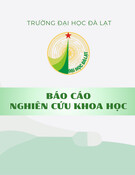
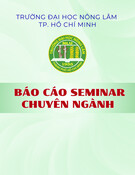
![Báo cáo seminar chuyên ngành Công nghệ hóa học và thực phẩm [Mới nhất]](https://cdn.tailieu.vn/images/document/thumbnail/2025/20250711/hienkelvinzoi@gmail.com/135x160/47051752458701.jpg)
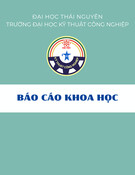
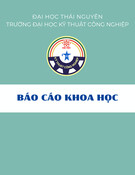
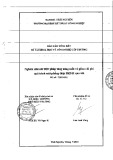
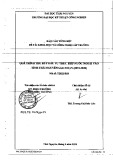











![Bộ Thí Nghiệm Vi Điều Khiển: Nghiên Cứu và Ứng Dụng [A-Z]](https://cdn.tailieu.vn/images/document/thumbnail/2025/20250429/kexauxi8/135x160/10301767836127.jpg)
![Nghiên Cứu TikTok: Tác Động và Hành Vi Giới Trẻ [Mới Nhất]](https://cdn.tailieu.vn/images/document/thumbnail/2025/20250429/kexauxi8/135x160/24371767836128.jpg)





